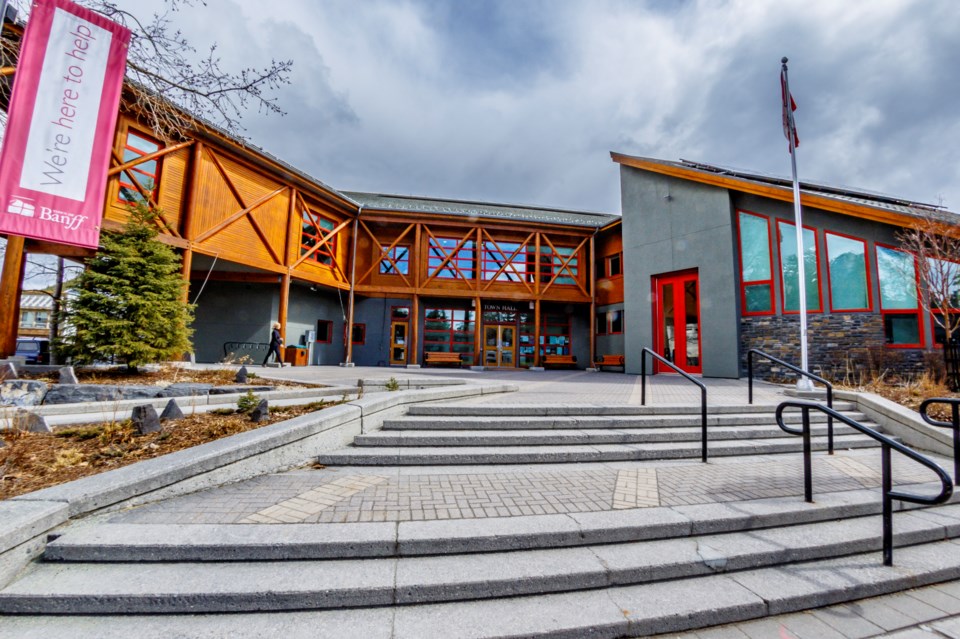BANFF – Banff RCMP and bylaw officers are doing random patrols to ensure residents and businesses are complying with COVID-19 restrictions aimed at slowing the spread of the virus.
As of last Friday (Dec. 4), most of Banff’s community peace officers in the bylaw enforcement department were authorized by the Alberta government under the provincial state of health emergency to enforce the provincial health orders – existing and new.
But when it comes to business compliance, Town of Banff officials say that Alberta Health Services requires the municipality to ask the health authority to investigate and enforce.
“We help monitor and report,” said Jason Darrah, the Town of Banff’s director of communications.
As of Thursday (Dec. 10), there were 78 active COVID-19 cases in Banff and Lake Louise, down from a high of 192 on Nov. 29. Of 334 reported cases in Banff National Park since the start of the pandemic, 256 people have recovered.
In neighbouring Canmore, there are 34 active cases, and the same number in the Municipal District of Bighorn, which includes Harvie Heights, Lac des Arcs and Exshaw, Kananaskis Country recorded its fist active cases this week. As of Thursday, there were four positive cases there.
With 20,163 active cases province-wide, the provincial positivity rate now sits at approximately nine per cent. There are 682 people in hospital, including 124 who have been admitted to the ICU.
There were 13 more deaths related to COVID-19 reported to AHS in the previous 24 hours, bringing the provincial death toll from the virus to 666 as of Dec. 10.
New provincial government restrictions to curb the spread of COVID-19 announced on Tuesday (Dec. 8) extended the ban on indoor social gatherings to include outdoor social get-togethers.
Many businesses are also being forced to close, effective Dec. 13, although restaurants, bars and coffee shops can offer takeout, curb side pickup or delivery. Retailers are restricted to 15 per cent of their normal customer base.
In addition, the Alberta government ordered wearing masks as mandatory in all indoor public spaces and workplaces and facilities outside the home, with a few exceptions.
Banff already had adopted its own indoor and outdoor mask bylaw early in the pandemic.
In November, council extended the outdoor mask bylaw to include most of downtown and all of Banff Avenue, from the Parks Canada administration building to the townsite boundary at the east entrance to Banff.
Alison Gerrits, the Town of Banff’s acting director of emergency management, said outdoor mask compliance was extremely high in the downtown core last weekend.
“Virtually all the reminders needed were directed towards visitors who indicated their awareness of the indoor requirement, but not the outdoor one,” she said.
“These checks will be conducted on a random basis going forward.”
With the holidays ahead, Dr. Deena Hinshaw’s Alberta’s chief medical officer of health, said she knows the new restrictions on all indoor and outdoor social gatherings have disappointed many Albertans.
“In a year filled with so many sacrifices, it seems unfair to ask for more – but as social gatherings are a leading cause of transmission, this is our only option,” she said in her Thursday afternoon COVID-19 update.
Provincial COVID-19 restrictions at a glance
Effective immediately:
• All indoor and outdoor social gatherings – public and private – are prohibited. Close contacts are limited to household members only. People who live alone can have up to two close contacts, who are the same people for the duration of the restriction. If the close contacts do not live alone, visits cannot be held at their home.
• Masks are mandatory in all indoor public spaces and workplaces and facilities outside the home, except when working alone in an office, or a safely distanced cubicle or a barrier is in place, or in rental accommodations (hotel rooms).
Effective Dec. 13 at midnight – for at least four weeks:
• All restaurants, pubs, bars, lounges and cafés are closed to in-person service. Takeout, curb-side pickup and delivery services are allowed.
• Retail services must reduce customer capacity to 15 per cent of fire code occupancy, or a minimum of five customers. This includes grocery stores, pet supply stores, pharmacies, clothing stores, gift shops, hardware stores, liquor and cannabis stores. People must shop only with the people you live with.
• Shopping mall overall capacity is limited to 15 per cent, including common areas and individual stores and food courts are open for grab-and-go only.
• All entertainment businesses and entities must close, including libraries, galleries, museums, theatres, fitness centres, and pools.
• All indoor recreation facilities must close, including gyms and studios, fitness and recreation centres, spas, pools, and arenas.
• All personal and wellness services must close including esthetics, manicure, pedicure, body waxing, make-up, body, nose and ear piercing, and tattoos, cosmetic skin and body treatments and massage.
• Working from home is mandatory when physical presence is not required.
Remaining Open:
• Skating rinks and ski hills.
• Hotels remain open, but pools and fitness centres closed, dining rooms closed but room service allowed.
• Medical clinics, dentists, physical therapists, optometrists, acupuncture, child care.
• Professional services can remain open by appointment only, including lawyers, accountants and photographers.




